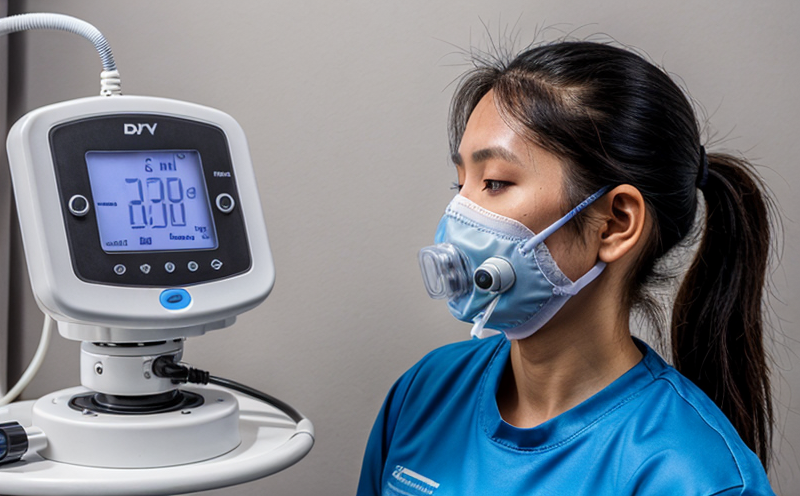ASTM F2299 Particle Filtration Efficiency Testing for Masks
The ASTM F2299 standard is a critical benchmark in the medical device industry, particularly for respiratory and ventilation masks. This standard specifies the test methods to determine the particle filtration efficiency of face masks intended for use by healthcare workers and other personnel involved in patient care. The primary objective of this testing is to ensure that masks effectively filter out harmful particulate matter, including bacteria, viruses, and other airborne contaminants.
The ASTM F2299 standard covers three key methods: submicron particle filtration efficiency (SMPE), total inward leakage (TIL), and total outward leakage (TOL). Submicron particle filtration efficiency is the most relevant for determining how well a mask can protect against very small particles. This method involves measuring the percentage of submicron particles that are retained by the mask.
The testing procedure requires the use of specialized equipment, such as an air pump and a dust generator to produce submicron particles. The sample mask is placed between the particle source and the collection chamber. The air flow is directed through the mask, and the percentage of particles retained on the filter downstream from the mask is measured. This measurement provides crucial data that can be used to assess the effectiveness of the mask.
Compliance with ASTM F2299 is essential for quality assurance in medical device manufacturing. It ensures that masks meet stringent performance criteria, thereby protecting healthcare workers and patients from airborne pathogens. The test results are typically reported as a percentage, indicating how much particulate matter was retained by the mask during testing.
The importance of this testing cannot be overstated, especially given the ongoing global health challenges, including pandemics like COVID-19. Masks that meet or exceed the ASTM F2299 standards provide an additional layer of protection against airborne diseases and other respiratory hazards.
In summary, ASTM F2299 particle filtration efficiency testing is a critical process in ensuring the safety and effectiveness of respirators and ventilation masks used in healthcare settings. This testing helps manufacturers ensure that their products meet rigorous international standards, thereby safeguarding public health.
Benefits
The benefits of ASTM F2299 particle filtration efficiency testing are numerous and far-reaching. By ensuring that masks meet the specified performance criteria, this testing contributes significantly to improving patient safety and healthcare worker protection. Here are some key advantages:
- Informed Decision-Making: Testing provides objective data that aids in making informed decisions about mask selection and purchasing.
- Quality Assurance: Ensures consistent performance across all batches of masks produced by a manufacturer, leading to high-quality products.
- Customer Trust: Compliance with international standards enhances customer confidence, which is crucial for maintaining market presence and reputation.
- Risk Reduction: By identifying potential weaknesses in mask design or manufacturing processes early on, risks associated with substandard products can be minimized.
- Regulatory Compliance: Ensures that masks meet regulatory requirements, streamlining the process of obtaining necessary certifications and approvals.
- Healthcare Worker Safety: By reducing exposure to harmful particles, this testing directly contributes to improved safety for healthcare workers.
- Patient Protection: Masks that perform well in filtration efficiency tests can provide an additional layer of protection against airborne diseases and contaminants.
In conclusion, ASTM F2299 particle filtration efficiency testing is a vital component of quality assurance programs. It not only enhances product performance but also fosters trust among stakeholders while ensuring regulatory compliance.
Eurolab Advantages
EuroLab offers unparalleled expertise and state-of-the-art facilities for ASTM F2299 particle filtration efficiency testing. Our team of experienced professionals ensures that every test is conducted with precision and accuracy, providing reliable results that meet or exceed international standards.
Accurate Testing Equipment: We utilize high-precision equipment to conduct the necessary tests according to ASTM F2299 specifications. Our instruments are regularly calibrated to ensure consistent and accurate measurements.
Comprehensive Reporting: EuroLab provides detailed reports that include all relevant test parameters, ensuring transparency and ease of interpretation for our clients.
Expertise in Medical Device Testing: With years of experience in medical device testing, we have the knowledge and expertise to handle a wide range of respiratory and ventilation masks. Our team understands the specific requirements of each product and can tailor tests accordingly.
Regulatory Compliance: EuroLab stays updated with all relevant regulations and standards, ensuring that our clients meet all necessary requirements for their products.
Swift Turnaround Times: We understand the importance of timely results in the medical device industry. EuroLab prides itself on delivering accurate test reports quickly, helping our clients make informed decisions promptly.
In summary, Eurolab's commitment to excellence, combined with state-of-the-art facilities and experienced professionals, makes us a trusted partner for ASTM F2299 particle filtration efficiency testing in the medical device industry. Our services are designed to support quality assurance programs and ensure regulatory compliance while providing reliable test results.
Use Cases and Application Examples
| Use Case/Application Example | Description |
|---|---|
| Hospital Respiratory Protection: | Masks used in hospitals to protect healthcare workers from airborne pathogens. |
| Clinical Trials: | Testing of masks used during clinical trials involving respiratory health subjects. |
| Pandemic Response: | Assessment of mask performance in containing viral particles during a pandemic. |
| Emergency Preparedness: | Evaluation of masks for use during natural disasters or other emergency situations involving respiratory risks. |
| Industrial Hygiene: | Determining the effectiveness of masks used in industrial settings to protect against airborne contaminants. |
| Research and Development: | Evaluating new mask designs or modifications for improved filtration efficiency. |
| Schools and Universities: | Testing masks used in educational environments to ensure safety during outbreaks of respiratory illnesses. |
The above use cases highlight the versatility and importance of ASTM F2299 particle filtration efficiency testing. These tests are crucial for ensuring that masks perform effectively under various conditions, thereby protecting individuals from airborne hazards.





